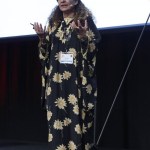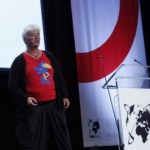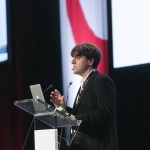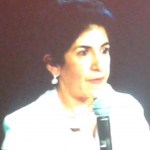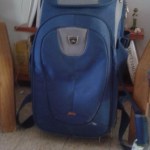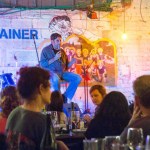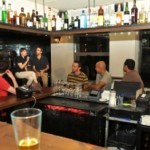Science event
Next week is a big week for science in Israel. Tuesday is National Science Day, and Thursday is the annual Science on Tap talks in the bars and restaurants of Tel Aviv. Don't know about National Science Day -- this science writer will just point out that of all the minstries that are being fought over tooth and nail in our new government, the Ministry of Science does not even appear the list.
Science on Tap, however, is gearing up with the splash it deserves. Here is the main drag outside the huge Azrieli complex:
So if you're in or around Tel Aviv next week, check it out. All the…
The last lecture of the last session was by Cass Sunstein. Sunstein is one of the architects of "nudge" thinking. He is a law professor, but he works with behavioral economists to develop his ideas and policy proposals. He has worked with the Obama government to develop "nudge" policies and his ideas are being copied all over the world, especially in the UK, which has a nudge unit.
Sunstein thinks of the policies he develops as "paternalistic libertarianism," a label that could ruffle more than a few feathers. I think one needs to approach Sunstein and his fellow nudgers with an open…
Yesterday was policy day, as far as keynote speakers were concerned. Lidia Brito is the UNESCO director of science policy and capacity building. Among the usual points about the need to change, building capacity and recognizing stakeholders, here is what I believe is her take home message: Science is changing, and that's a good thing. We need to keep going in this direction, but change it even more.
Collaborations across countries and continents, the rise of science in China and India, and yes, MOOCs. In other words, we need to actively help create equality in science education and science…
Peter Krause, the ever-friendly and patient press officer for ESOF, says the best thing about the organization is that it began ten years ago as a grass-roots idea: scientists who wondered why Europe had no equivalent of the AAAS and decided to create one. Since then, it has grown in all directions, but it still retains the flavor of scientists creating spaces for scientific exchange on a pan-academic level.
That feeling was certainly present yesterday evening, at a session on science communication. The speakers were three communicators in very different fields. The first, Angel…
I have definitely reached information overload, which is unfortunate because I am missing Brian Schmidt's talk. However, of all the things I have heard and seen today, there is one talk I need to write about: Ice cores in Greenland.
Dorthe Dahl-Jensen is one of the most cited scientific authors. period.
Dorthe Dahl-Jensen
That is probably why she can get away with lecturing in this wonderful T shirt.
Dahl-Jensen goes to Greenland with a large team to drill ice cores. And those cores, of course, contain precise records of the climate going back tens and hundreds of thousands of years. From…
The sun came out and I was called out of a session, so I took advantage of the sunshine, after three days of grey and drizzle, to see the outdoor booths set up all around the buildings in the Carlsberg complex, here. In fact, in conjunction with this main festival of science, the city of Copenhagen is hosting a "Science in the City" fair here and all over the city. Here's what I saw:
The point of this 3-D printed head is to create better devices -- eg. hearing aids. Several 3-D printers on display.
Here's my favorite:
They are working on a "family" solar car. Not sure how a family will…
Aside from the actual science, I am learning that 1) Copenhagen can be quite cold in the summer and 2) that the natives here are quite friendly. More than once people on the street have stopped to help me find my way. And the streets are full of people -- walking, riding bikes, taking buses. It seems to be a fitting place to have sessions on urban planning. From what I can see, Copenhagen has adopted some of the better ideas.
After a morning of biology, I went for physics and aerospace in the afternoon. The subject was the Google LunarX prize. To get the $20 million, the winning team…
Today we get to the science and the issues surrounding it. Karl Deisseroth gave the first keynote lecture. For anyone who's been asleep the past few years, Deisseroth's lab at Stanford is at the cutting edge of a new kind of brain research. They invented optogenetics -- turning brain circuits on and off (in mice, at present) with fiberoptic lasers. Their lab is putting out new methodology at an astounding rate. Their latest is Clarity: a way of making the brain tissue clear, so you can see all the neurons at once. In other words, you can get an image of the whole brain. I know I am not the…
Fabiola Gianotti
I should start with the ESOF 2014 opening ceremony, but instead, I need to go back to the rest of the journalists conference. Specifically to the prize - yes there was a prize. It went to a guy with dreadlocks down past his waist who stages science events in Christiania -- the still-existent hippie/anarchist community in the middle of Copenhagen. Among other things, he could talk about deconstructing academic while listing things that suck. Instead of describing, I'll tell you to visit his website: Science and Cocktails (scienceandcocktails.org). (Sorry, the iPad…
In less than 24 hours I'll be going through security checks, hoping my stopover in Warsaw will go smoothly. Nothing is packed yet, but the credit card that was eaten by a voracious ATM at the beginning of the week has been replaced, gifts have been purchased for various people, included the couple who will be hosting me for three nights, pants have been hemmed. Still not convinced that the new card will work in Danish machines. My cell phone company has just replaced my trusty old "dumb" phone with a brand new "smart" one in hopes I'll use lots of apps and internet services. That…
What can I say about an event that counts both Carlsberg (as in the brewery) and Nature (the scientific journal) amongst its sponsors? That event will be the EuroScience Open Forum (ESOF) 2014. In just a week, I’ll be stepping out of my little bubble in the Weizmann Institute of Science in Rehovot, Israel, on my way to ESOF 2014, held this year in the big city of Copenhagen. There, I’ll be joining several thousand others, from Nobel laureates to mere journalists in a week-long marathon of science-related events.
I’ll be blogging daily from the week-long science fest. Not to name-drop, but…
Science on Tap, which happened in Tel Aviv last Weds. eve, was as great a success as ever. Ariela Saba, one of our Weizmann writers, attended one of the talks. Here is her report:
Right around now – in some 55 bars all around Tel Aviv and Jaffa – Weizmann Institute scientists are starting their talks. Some of the patrons are in the middle of dinner; others are already sipping after-dinner drinks. Here in The Container at the Jaffa port, Dr. Eran Elinav is just warming up. From where I am sitting, I can see into the kitchen: Plates are making their way out laden with fluffy white bread, butter…
Prof. Mario Livio takes the long view on science. In his newest book, Brilliant Blunders, he points out some of the mistakes made by some icons of science -- Einstein and Pauling among them. More importantly, he insists that researchers must be free to make mistakes.
Livio recently gave us a taste of his subject matter in a talk at the Weizmann Institute (in English):
http://www.youtube.com/watch?v=sYaMlTn275A
No, the woman with the microphone is not crooning lounge songs to customers. That is Prof. Deborah Fass, and she is explaining the latest structural biology research in her lab.
And this is Weizmann Institute president Prof. Daniel Zajfman in an official Science on Tap 2012 T shirt giving pub goers a talk on the economic and social importance of basic science.
No matter how big we make the yearly Science on Tap event, it is never big enough. Those who don't make their reservations in time are left out on the sidewalk straining to hear. People have been writing and calling begging us to…
Explain to a pub full of beer drinkers exactly what it is you do in your lab. That's the idea behind Science on Tap, which will be taking place again this year in bars, coffee shops and restaurants in the heart of Tel Aviv's entertainment district at the end of the month.
A Science on Tap billboard like this hangs over the entrance to Tel Aviv - the number has since risen to 55
This one is the biggest event yet: Over 55 Weizmann professors, doctoral students and assorted researchers have volunteered to spend an evening talking about their science to a public out looking for information and…
If you followed this year's chemistry Nobel, you know about the quasicrystal design on the ties made for Prof. Dan Schechtman's 70th birthday. Even the prime minister was seen sporting one last week. But did you know there is also a quasicrystal scarf?
While Prof. Schechtman was getting his white tie and tails ready for the formal ceremony, this scarf was on display in fashionable Tel Aviv around the shoulders of Prof. Gitti Frey, a nanoscientist at the Technion.
Despite the photo op, fashion took a back seat to science last Thursday evening. Frey was the guest speaker at a Science on Tap…
The other week, while many Israelis stayed home to clean their kitchens before the upcoming Passover holiday and thousands of preteens were screaming themselves hoarse over Justin Bieber in a Tel-Aviv park, another sort of cultural event was taking place nearby. Following the success of the beer and science event in Rehovot, we took Weizmann scientists and students to the bars and cafes of Tel Aviv.
No one was quite sure if it would work. Rehovot, after all, is the city of science, while Tel Aviv is the city of culture - of music, art and theater. But, it's also the city of nightlife, and it…
Is having a beer and sandwich at the local pub the best way to improve your brain awareness? At least in the city of Rehovot one evening last week, those eating and drinking in a few select establishments got to hear Weizmann Institute neurobiology graduate students give informal talks and demonstrations. The event was a part of Brain Awareness week, an annual, international affair. The aim is not really to make people more aware of their brains (or their brains more aware), but to promote brain research.
Some participated in an experiment in which they found that a smell can help imprint…
Thousands came to the Weizmann Institute yesterday evening for Researchers' Night activities. Researcher's Night is sponsored by the EU, and it takes place all over Israel and across Europe. In addition to lab tours and showings of 3-D films of molecular structures, the Clore Garden Science -- an outdoor science museum on the Weizmann campus -- swarmed with activity. Especially popular were the fire juggler, hands-on educational activities in the EcoSphere, and the telescopes set up especially for the event.
Israel's Minister of Science and Technology gets a lesson in physics
Atop the…


